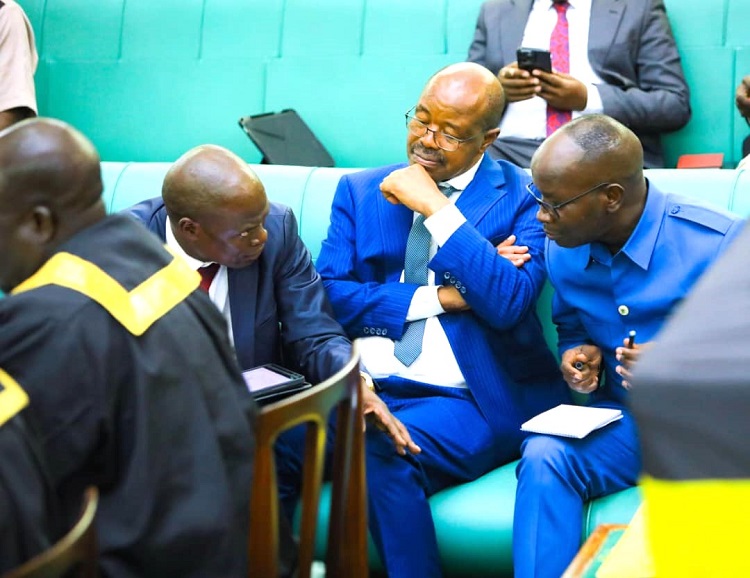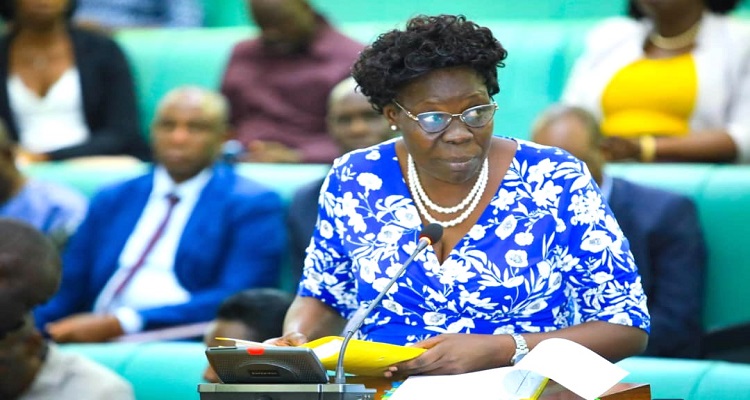Finance ministry queried over Shs4 trillion irregular expenditure

Parliament has tasked the Ministry of Finance, Planning and Economic Development to explain the spending of Shs4.05 trillion without prior approval from Parliament.
The matter came to the fore on Friday, 12 April 2024, during the debate on the ministerial policy statements and budget estimates for the finance ministry for the Financial Year 2024/2025.
The report was presented by Hon. Jane Avur, the Deputy Chairperson of the Committee on Finance, Planning and Economic Development and also Pakwach District Woman MP.
Hon. Geofrey Ekanya (FDC, Tororo North County) said that in a meeting of the Budget Committee with officials from the finance ministry last week, the committee was informed that the ministry issued treasury bills and borrowed money to increase the budget for the Financial Year 2023/2024 to the tune of Shs4 trillion without Parliamentary approval.
"I expected that the Ministry of Finance today would have brought that position and appropriate action because that led to abuse of office. We expected heads to roll, but I am surprised that Hon. Amos Lugoloobi has come to this House without clear explanation. Under what legal framework did the Ministry of Finance borrow Shs4 trillion?" he questioned.
The Speaker of Parliament, Anita Among, who presided over the sitting, recalled that in the previous financial year when there was a shortage, the ministry brought a supplementary and it was passed, wondering what gave them the powers to just do it behind the curtain this time.
Among, who revealed that whilst the finance ministry had declared it as Shs3 trillion, the Auditor General had put it at Shs4 trillion, also referred the finance minister to section 21(2) of the Public Finance Management Act, 2015.
The section states that; "A vote shall not take any credit from any local company or body unless it has no unpaid domestic arrears from a debt in a previous financial year, and it has the capacity to pay for the expenditure from the approved estimates as appropriated by Parliament for that financial year".
The Speaker, to the relief of the minister, said that the committee’s report would be passed although the outstanding issues must be explained extensively.
"The amendments we are going to make are; one, to open up Vote 130; two, to correct the figures using a corrigendum; and three, go and explain the Shs4 trillion - who gave you the powers - and domestic arrears, and we need that in the House," she guided.
In the finance committee's report, high domestic borrowing and interest costs were raised as a matter of urgency by the committee deputy chairperson. She stated that the government's increased reliance on domestic borrowing has led to high interest costs.
"To address this, there is a consideration to swap domestic debt totalling Shs1.86 trillion in the Financial Year 2023/24 with cheaper external debt of up to Shs500 million,” Avur said.
However, despite this effort, Avur revealed that the bulk of projected interest payments in 2024/25 financial year totalling Shs8 trillion is still attributed to domestic interest payments amounting to Shs6.4 trillion, adding that this trend could strain the budget and hamper service delivery.
The deputy chairperson further raised concern over undisbursed debt and commitment fees, stating that as of December 31, 2023, the committed but undisbursed debt stood at Shs14.42 trillion – a situation that is expected to lead to a surge in commitment fees from Shs19.34 trillion in Financial Year 2023/24 to Shs45.76 trillion in Financial Year 2024/25.

She noted that the Auditor General's report highlighted that the costs of tax incentives, such as tax holidays, exemptions, waivers, and refunds, outweigh the benefits, adding that in the Financial Year 2022/23 alone, these incentives amounted to foregone revenue of Shs1.41 trillion while not achieving desired objectives like employment generation, enhancing exports, or import substitution.
The committee also said there were inconsistencies noted between the draft budget estimates, ministerial statements, and the Appropriation Bill for 2024.
Hon. Sarah Opendi (Indep., Tororo District Woman Representative) faulted the finance ministry for only allocating Shs200 billion of the Shs1.86 trillion domestic debt clearance.
The Speaker called for the ministry to provide a breakdown for the domestic and international debt to ascertain the details including if they are fictitious or not.
Hon. Muhammad Nsereko (Indep., Kampala Central Division) said that the Government needs to focus on getting cheaper credits with good terms. He called on government to, for instance, look at Islamic banking.
"Probably, we can get cheaper credit mainly for infrastructure development and education to help us close the gap and stop us from getting expensive loans," Nsereko said.
Hon. Martin Mugabi (NRM, Buzaaya County) says that government's failure to pay local contractors has highly affected the integrity of contractors domestically. "If you have a contract from government and you want to go to the bank to get a loan, they will say no we cannot help you," he said.
